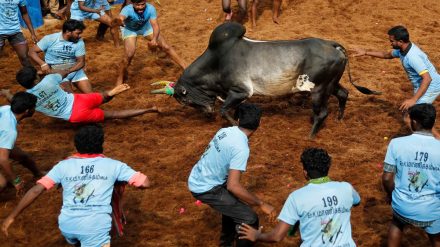The Supreme Court on Thursday upheld the validity of the amendment Acts of Tamil Nadu, Maharashtra and Karnataka which allowed bull-taming sport “Jallikattu”, bullock-cart races and buffalo racing sport “Kambala” respectively. A five-judge Constitution bench headed by Justice K M Joseph, which delivered a unanimous verdict, dealt with five questions referred to it by a two-judge bench of the apex court in 2018.
“Our decision on the Tamil Nadu Amendment Act would also guide the Maharashtra and Karnataka Amendment Acts and we find all the three amendment Acts to be valid legislations,” said the bench, also comprising justices Ajay Rastogi, Aniruddha Bose, Hrishikesh Roy and C T Ravikumar.
The bench also said that, “Since legislative exercise has already been undertaken and ‘Jallikattu’ has been found to be part of cultural heritage of Tamil Nadu, we would not disturb this view of the legislature.”
Jallikattu, also known as “Eruthazhuvuthal”, is a bull-taming sport from Tamil Nadu, popular in Madurai, Tiruchirappalli, Theni, Pudukkottai and Dindigul districts, which is known as the Jallikattu belt, and is celebrated during the Tamil harvest festival, Pongal.
‘Jallikattu’ timeline of events:
-2006 – The ‘Jallikattu’ issue reached the doors of the court since 2006 onwards, when the Madras High Court banned the bull-taming sport that year, following the death of a spectator in the violent sport.
-2009 – The ban was subsequently lifted with the Tamil Nadu Regulation of Jallikattu Act, 2009.
-2011- The Congress-led UPA regime at the Centre added “bulls” to the list of animals whose training and exhibition was prohibited.
-2014 – Supreme Court banned Jallikattu and struck down the 2009 Act, citing the 2011 notification.
-2015 – The Supreme Court dismissed Tamil Nadu government’s plea calling a recall of its verdict.
-2016 – The Narendra Modi-led NDS government’s environment ministry revoked the ban, issuing a notification, just months ahead of the Tamil Nadu Assembly elections. The Supreme Court later stayed the notification after it was challenged by the Animal Welfare Board of India (AWBI) and People for the Ethical Treatment of Animals (PETA).
-2017 – A major uprising took place in Tamil Nadu opposing the ban on the centuries-old bull-taming sport. Protestors carrying “Save Jallikattu” placards and banners walked from the lighthouse to the labour statue in Chennai’s Marina Beach. The protests went around for about 15 days.
Following the protests, the then Tamil Nadu government issued a new ordinance which amended the central Prevention of Cruelty to Animal Act, thereby allowing Jallikattu to go in the state. It was ratified by the President.
PETA along with other petitioners filed a plea challenging the amendment to the Prevention of Cruelty to Animal Act passed by the TN Assembly.
-2018 – A two-judge bench of the Supreme Court said that the petitions challenging the Prevention of Cruelty to Animals (Tamil Nadu Amendment) Act, 2017, required to be looked upon by a larger bench as it involved substantial questions relating to the interpretation of the Constitution. The bench of Justices Dipak Mishra and Rohintan Nariman referred the batch of writ petitions to a five-judge Constitution bench.
-2022- The Constitution Bench of the Supreme Court reserved its judgment on pleas challenging Tamil Nadu and Maharashtra laws allowing bull-taming sport ‘Jallikattu’ and bullock cart races.
-2023 – The five-judge Constitution bench headed by Justice K M Joseph delivered a unanimous verdict on Jallikattu, and upheld the validity of amendment Acts of Tamil Nadu, Maharashtra and Karnataka which allowed bull-taming sport “Jallikattu”, bullock-cart races and buffalo racing sport “Kambala” respectively.
